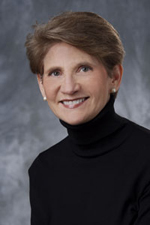 (EDITOR’S NOTE: This is the fourth in a series of stories about a move to ban affirmative action in Nebraska and the potential impact such a policy change would have at UNMC.)
(EDITOR’S NOTE: This is the fourth in a series of stories about a move to ban affirmative action in Nebraska and the potential impact such a policy change would have at UNMC.)
Growing up in London, Sweden, Australia, Singapore and Canada, Virginia Tilden, D.N.Sc., knew what it was like to be in the minority.
“I was often the only American kid, so I was an outsider a lot,” the UNMC College of Nursing Dean recalled. “I had to figure out how to blend in and manage the cultural divide.”
As the only female dean at UNMC, Dr. Tilden is again in the minority. While not complaining, she does believe that leadership in health care is not representative of the country.
“Health care, and for that matter leadership in health care, should look like the face of America — gender balanced, multicultural and multi-ethnic,” she said. “Women and minorities expand the range of perspectives. It’s really important to vary perspectives on any issue. Institutions are enriched by that.”
UNMC uses a variety of pipeline and recruitment programs to encourage women to take on leadership roles and to recruit underrepresented students into careers in science.
 |
Virginia Tilden, D.N.Sc. |
To place the measure on the November ballot in Nebraska, supporters must collect verified signatures from 10 percent of the state’s registered voters, or about 115,000 Nebraskans, by July 4.
“This ban would tie our hands with what we need to do,” Dr. Tilden said. “We need to take every action and make every effort to give people a leg up who would otherwise find and feel restrictions in gaining a higher education. We need to go the extra mile to introduce health professions careers to minorities and first generation college-bound students who, without extra help and support, may perceive a college education as unreachable.”
Without similar guidance and direction from her mentors, Dr. Tilden said her career wouldn’t have unfolded as it has.
“My whole career has been a series of invitations through doors of opportunity by someone who believed I had the talent to step up,” she said. “Affirmative action is not about lowering the bar — it’s about making the bar more available to everyone. There is no such thing as a free ride, but we want to ensure the doors are properly opened to the full fabric of American society.”
Dr. Tilden also credits role models, such as her grandmother — a military spy in World War I and a suffragette who marched for the vote in Washington — with helping to inspire her.
|
|
Dr. Tilden also has been influenced by women leaders in science and the humanities. Her current hero is the first female president of Harvard University, Drew Faust.
“Watching strong women has given me the courage to say, ‘I can, too,'” Dr. Tilden said.
Appointed to dean of UNMC’s College of Nursing in 2003, Dr. Tilden was the associate dean for Oregon Health and Sciences University School of Nursing for 13 years before that.
“I always encouraged people to reach for the next level, but I realized I wasn’t walking the talk when I was the associate dean,” she said. “You have to get out of your comfort zone.”
Dr. Tilden notes that even though the year 2008 has seen its first fully qualified female candidate for presidency, there is still a long way to go.
“There are still plenty of hurdles for women to overcome,” she said.
However, it’s not just women and people of color who are affected by affirmative action. The list of people includes residents of rural areas as well as men. Only 10 percent of nurses are male, which is why UNMC’s College of Nursing works to recruit men into the field. That includes a recent campaign, “Are you Man enough to be a Nurse?”
“As our society diversifies, we need to assure proportionate diversity among nurses providing health care,” said Dani Eveloff, UNMC College of Nursing recruitment coordinator. “We are proud of a 12 percent increase in males admitted last year to our baccalaureate program, as well as a 19 percent increase in enrolled students from underrepresented racial or ethnic backgrounds.
“At the same time, we recognize that Omaha is below the national average in African American nurses and we seek to change this statistic. We are proud to host a very active local chapter of the National Association of Hispanic Nurses.”
Dr. Tilden agreed.
“We have a major problem with health disparities in our country,” she said. “Ethnic minorities typically receive care that is not as good as white, middle class Americans, particularly in areas such as pain management, preventative care, and early disease detection and treatment. That can only be changed if we champion a diverse health care workforce.
“My dream is that young people of all racial and ethnic groups without regard to gender always have the attitude that the next door will open with hard work and without preset bias. I hope in my lifetime, I will see the barriers for women and minorities come tumbling down.”